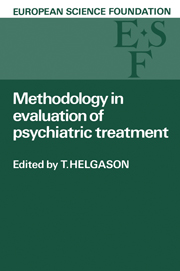 Methodology in Evaluation of Psychiatric Treatment
Methodology in Evaluation of Psychiatric Treatment from II - EVALUATION CRITERIA
The need for evaluation of milieu therapy
In general terms, milieu therapy can be defined as a planned treatment environment where all activities and social relations are supposed to serve a common therapeutic goal.. Within this broad, and rather vague definition, there are different types of milieu therapy, according to theoretical background, methods and goals, from ‘the therapeutic community proper’ to behaviour modification by ‘token economy’. Whereas the negative effects on patients of the traditional, custodial hospital setting have been well documented, it has been more problematic to prove the positive effects of specific types of milieu therapy. This, of course, does not necessarily imply that milieu therapy does not work, as some of the opponents seem to mean. The rather inconclusive situation shows, however, the need for more effort to be put into evaluation and for the development of evaluation methods in this field. The present economic situation, with increasing problems in getting funding for health work, makes this need even stronger.
Components of evaluation
Milieu therapy, not being one single therapeutic method, but rather a variety of treatment programmes consisting of different components, may be evaluated according to the same guidelines as for health programmes in general. The-main components are the following, referring to WHO publications:
(a) relevance
(b) progress
(c) effectiveness
(d) efficiency
(e) impact.
(a) Relevance relates to the rationale for having programmes, or services and institutions, in terms of their response to essential human needs and health policies and priorities.
(b) Progress is concerned with the comparison of the actual with the scheduled programme delivery, the identification of reasons for achievements or shortcomings, and indications for remedies for any shortcomings. The purpose of a progress review is to facilitate the monitoring and operational control of on -going activities. In the terms of systems analysis it is a review of the use of ‘inputs’.
(c) Effectiveness is an expression of the desired effect of a programme, service or institution in reducing a health problem or improving an unsatisfactory health situation. Thus, effectiveness measures the degree of attainment of the pre-determined objectives and targets of the programme, service or institution. The assessment of effectiveness is aimed at improving programme formulation or the functions and structure of health service and institutions through analysis of the extent of attainment of their objectives.
To save this book to your Kindle, first ensure [email protected] is added to your Approved Personal Document E-mail List under your Personal Document Settings on the Manage Your Content and Devices page of your Amazon account. Then enter the ‘name’ part of your Kindle email address below. Find out more about saving to your Kindle.
Note you can select to save to either the @free.kindle.com or @kindle.com variations. ‘@free.kindle.com’ emails are free but can only be saved to your device when it is connected to wi-fi. ‘@kindle.com’ emails can be delivered even when you are not connected to wi-fi, but note that service fees apply.
Find out more about the Kindle Personal Document Service.
To save content items to your account, please confirm that you agree to abide by our usage policies. If this is the first time you use this feature, you will be asked to authorise Cambridge Core to connect with your account. Find out more about saving content to Dropbox.
To save content items to your account, please confirm that you agree to abide by our usage policies. If this is the first time you use this feature, you will be asked to authorise Cambridge Core to connect with your account. Find out more about saving content to Google Drive.